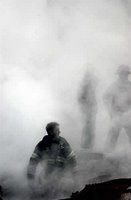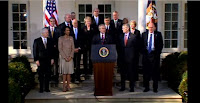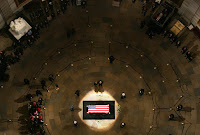President Bush Welcomes Chancellor Merkel of Germany to the White House
Cross Hall, FULL STREAMING VIDEO, 6:35 P.M. EST. In Focus: Global Diplomacy
| This new year marks the beginning of Germany's presidency of both the EU and the G8. And we just had a wide-ranging discussion about a lot of issues. | 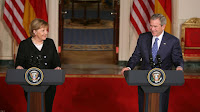 |
We spent time talking about Afghanistan, and I appreciate very much, Madam Chancellor, your support for the people of Afghanistan. You take your NATO commitments seriously. We're proud to serve alongside such a strong ally.
| We talked about the Israeli-Palestinian issue. And Madam Chancellor had a good idea to convene the Quartet, which I agreed to. I think the Quartet ought to meet at an appropriate time. | 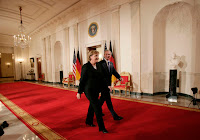 |
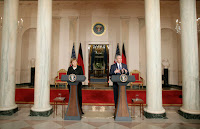 | We talked about Lebanon. And one thing is for certain, this administration -- and I'm confident Chancellor Merkel, as well -- will support the Siniora government. |
We talked about Darfur. I appreciate very much Chancellor Merkel's deep concern for the suffering that goes on in Darfur. You may realize that my administration has called the suffering there a genocide. We take the issue very seriously. We expect the Bashar government to make more progress toward allowing there to be not only security, but goods and supplies provided to the people that suffer there. And Madam Chancellor understands the issue. I appreciate the fact that German planes are flying relief into Darfur. Your great country is making a strong commitment and we look forward to working with you as the head of the EU, as well, to help end the suffering there in that part of Africa.
We talked about trade. We're committed to the Doha round. We've got hard work to do to overcome our obstacles. But we spent a -- we had a good, frank discussion on the subject. Jose Barroso and his trade minister will be coming to the United States on Monday; we'll continue to further our dialogue on Doha. But I believe we can get a deal done -- it's just going to take a lot of will and a lot of hard work to do it. I know it is going to be necessary if we really do want to deal with global poverty, to have a successful round at Doha. Trade is the best way to help poor nations develop their economy so that people can realize the benefits of wealth moving throughout their society.
We talked about climate change. And I assured the Chancellor that I've been committed to promoting new technologies that will promote energy efficiency, and at the same time do a better job of protecting the world's environment. And I believe there's a chance now to put behind us the old, stale debates of the past and focus on technological developments that will enable us to be good stewards of the environment, and at the same time enable us to become less dependent on oil and hydrocarbons from parts of the world that may not like us.
Here in the United States, we're going full-steam ahead with new technologies that will change the way we drive our cars and power our homes and light our streets. And so, Madam Chancellor, we've discussed a lot. We'll have a chance to further our discussions over dinner. I'm so happy you're here. I appreciate you taking time to come and visit. The floor is yours.
CHANCELLOR MERKEL: (As translated) -- and the G8 presidency and the fact that this trip here to Washington happens today are certainly not a matter of coincidence, but it is clearly an expression of the fact that we share values, that there are a lot of common interests between our two countries, and that there is also a lot of need for enhanced cooperation between the European Union and the United States of America. We clearly are in need of that cooperation in order to make further progress in solving the problems besetting the world of today.
There are a lot of issues that we debated here today that have clearly a connection to our presence in the European Union. The Doha Round is one issue that comes to mind. We would like to cooperate very closely on that. We are all aware of the fact that this window of opportunity that we have is closing fast. We need to act swiftly. And it was with great pleasure that this is, indeed, an issue that is very important, not only to the European Union, but also to the United States of America.
We will have to further exchange also our views with the G20 in order to achieve an objective that is in our interest and is in their interest, that helps them to get access to our markets and that also helps us.
There will be a G8 meeting later on in the year, and there will be issues related to that that will deal with the climate change, is one. I was delighted to hear that there is a readiness here and we shall continue to work on this -- our experts, indeed, work on this.
On the one hand, we obviously need economic growth. But on the other hand, a reduction, also, of greenhouse gases. We were at one on this. And energy efficiency is the primary goal that we need to attain. There are a lot of areas where we are confident we can cooperate, starting from biofuels to new technologies that we are going to develop. Between the European Union and the United States, I think there is a wide scope for further talks on this.
We also talked about this project of a future common market, joint efforts to make our economic forces so efficient that these economies, our two economies that, after all, rest on the same values, can be rendered more efficient. There will be close contacts; we will set up a working group that will further explore those issues and that will then prepare for the EU-U.S. summit.
It's certainly an uphill battle. I always describe it as a sort of thick board that needs to be chalked at. And what we're dealing here with is, for example, patent laws, international financial markets, protection of intellectual property rights, and so on.
We also talked about the international situation, the situation particularly here in the Middle East. We thought that, for example, in the framework of the Quartet, the European Union can do a lot in order to bring about a solution to the problems besetting the Middle East. I'm delighted to hear that Secretary of State Condoleezza Rice is going to go to the region shortly. I think this is the right point in time to take some time and reflect what the Quartet can actually do in order to bring about a solution.
We would like the European Union to speak with one and the same voice, saying we want a two-state solution, we want the recognition of the state of Israel by the Palestinians, we want to strengthen President Abbas, and we also want to strengthen, to bolster the evolution of a strong Lebanon. We discussed this today, too, and we also discussed the measures that we think need to be taken.
We cooperate very well in Afghanistan. It was an issue that we discussed at greater length during the NATO meeting in Riga. There will by the end of January be a NATO meeting on that particular issue. I think this is going to be actually very important, that particular meeting, in order to take up where we left off in Riga, to concentrate on military projects, obviously, but also to give a very strong boost to civilian projects so that we might continue to build on what we agreed during the last NATO meeting.
Obviously, we also talked about the situation in Iraq. Allow me to say although Germany is not militarily present in Iraq, we have every interest in seeing Iraq taking a turn for a more peaceful development, where people no longer need to be in fear of their lives, and that politically we shall do everything we can in order to give support to such a positive development.
Well, my impression is that over the next six months during our presidency there is a lot on the agenda. There are a lot of common interests, as a I said, and a lot of areas where I feel we can tackle problems together. And I think this dialogue is just the beginning of a very intensive dialogue we shall continue to have during our presidency -- this is, after all, a sixth meeting already. So I think we may safely speak of a continuous exchange of views. Thank you yet again for the invitation, Mr. President.
Q Thank you, Mr. President. You spoke for nearly two hours today with Iraq's Prime Minister. Do you both agree now on the need to send more U.S. troops to Iraq to deal with the rising violence in that country?
PRESIDENT BUSH: Well, Ben, my thinking is taking shape. I'll be ready to outline a strategy that will help the Iraqis achieve the objective of a country that can govern, sustain and defend itself sometime next week; I've still got consultations to go through. Whatever decision I make, though, will be all aimed at achieving our objective.
I did have a good discussion with Prime Minister Maliki. It did nearly last for two hours. I talked about a lot of topics with him. One thing I was looking for was will -- to determine whether or not he has the will necessary to do the hard work to protect his people. And I told him, I said that, you show the will, we will help you. And that's -- I'm in the process of making up my final decision as to what to recommend -- what recommendations to accept. One thing is for certain, I will want to make sure that the mission is clear and specific and can be accomplished.
Q Madam Chancellor, Mr. President, concerning the Middle East and the revival of the Quartet, did you consider to enlarge the mandate of the Quartet? And there have been talks in Europe about including Lebanon problems, maybe even talks to Syria and broadening the mandate of this, since last summer during the conflict of the northern border between Israel and southern Lebanon, you learned that all these problems are interlinked.
PRESIDENT BUSH: Your first part of your question? I didn't hear the first part of your question.
Q I was just referring --
PRESIDENT BUSH: Broaden the Quartet, is that what you said?
Q That broaden -- mandate of the Quartet, that you take care of more than the conflict between the Israelis and the Palestinians.
PRESIDENT BUSH: My view is the Quartet ought to stay focused on the Israeli-Palestinian issue, because when we solve that problem, a lot of other problems will be easier to solve.
Secondly, Syria knows exactly what she needs to do in order to reenter the nation -- reenter the -- you know, to be viewed as a nation that's constructive. And my own view is, is that we need to proceed with the Hariri tribunal as fast as possible, and hold people to account. If they murder somebody, they need to be held to account. People need to -- they need to bring this to conclusion.
So my attitude on Syria is they can be a much more constructive partner and they haven't been. They don't need to be told that in meeting after meeting after meeting. They get told that right here in a press conference like this. They know exactly what they need to do. And it's their choice to make.
CHANCELLOR MERKEL: I think that the Quartet actually has its work cut out for it, looking at the Middle East conflict, first and foremost. I mean, it needs to be spelled out clearly what one actually wants to achieve, and the players in the region need to have the necessary willingness to bring about a solution. They can be supported by the Quartet, and international unified opinion can be set up through the Quartet.
But I think the main task, really, is to push matters along, to give a support to Prime Minister Siniora to develop a truly sovereign Lebanon. I think Syria needs to be given a push there. And Syria, I think looking at, for example, the efforts made by the European Union, looking at the fact that the Foreign Minister of Germany went there to talk to them, Syria has been given a lot of opportunities. Unfortunately, they have allowed those opportunities to pass without taking any action. We expect Syria to change, but unfortunately so far, we haven't received any optimistic messages to that effect.
Q Mr. President, you mentioned that you see national reconciliation as a crucial goal there for your policy. Why then haven't you condemned the taunting that Saddam Hussein faced on the gallows from Shiite officials? And on a related subject, can you be more specific as to which day next week you'll be unveiling your Iraq policy?
THE PRESIDENT: The second part of your question, no. (Laughter.) First part of your question, I want you to anticipate the speech -- I want you to be thinking about it. I want you to be internalizing it.
Q (Inaudible.)
THE PRESIDENT: Thank you. I talked to Prime Minister Maliki about the videotape that was released during the execution of Saddam Hussein. He said he's going to fully investigate what happened. I appreciate that very much. One thing is for certain: A horrific chapter in Iraqi history has been closed, and now we're talking about a more hopeful chapter for the Iraqi people. And that's what I spent most of my time talking to him about.
We expect there to be a full investigation of what took place. The Iraqi people want to move forward, they want to forget that terrible part of their past and they want to live in peace. And it's in our nation's interest to help them do so.
So I spent a lot of time talking about the strategy to help achieve that objective, and that objective is a country that is an ally in this war on terror, a country that sends a strong example to reformers and women throughout the Middle East that it's possible to live in a free society that can work for the common good. I believe Prime Minister Maliki has the will necessary to make the tough decisions. That's one of the things I learned today. And in the meantime, he said he's going to fully investigate what took place.
Q Sir, do you have a personal reaction, though --
PRESIDENT BUSH: My personal reaction is, is that Saddam Hussein was given a trial that he was unwilling to give the thousands of people he killed. He was given a fair trial -- something he was unwilling to give thousands of Iraqi citizens, who he brutalized. I wish, obviously, that the proceedings had been done in a more dignified way. But, nevertheless, he was given justice; the thousands of people he killed were not.
Q I have a question to the President, and then a question to the Chancellor. Mr. President, now Germany tries to have a new action of the Middle East Quartet. And the debate always is how can European powers influence a superpower like the United States? Whether Germany objected Iraq or Tony Blair got along in Iraq, they had not much influence, the pessimists say. Can you give us one example where you changed your mind after talking to a European leader?
And, Mrs. Merkel, there are actually few successes of the Quartet over the past time. Were the efforts so weak, or are the problems so great that they simply have not been able to achieve progress? And what does this mean, what does this spell out for renewal of efforts?
PRESIDENT BUSH: I have come to realize that -- I don't know if I'd call this "change of mind," but one thing that my European friends have taught me is that the United Nations is an important body in order to be able to convince parliaments of hard work that needs to be done. For example, getting resolutions on Iraq at the United Nations is important for a country like Denmark or Holland, in order for them to go to their parliaments and say, we have U.N. approval.
As you probably are aware, I've really never felt like the United States needs to get United Nations approval to make decisions necessary for our security. But I have come to realize that other countries do rely upon the United Nations and I respect that a lot. So there's an area, for example, where I have been taught a lesson by my allies and friends.
I listen to Angela Merkel a lot. She has got a lot of wisdom. I don't know if this helps her or hurts her for me to say this, but nevertheless, my consultations with Angela are very productive and very important.
The United States needs to have good relations with Europe in order for us to achieve big objectives, whether it be trade or peace or security, it's -- the relations between Europe and the United States are vital. And sometimes the relations are -- can be difficult. Not every country agrees throughout Europe. And yet Angela always gives me good advice as to how to deal with the common problems we face in order to make sure that our alliance works for the common good. And I appreciate that very much.
CHANCELLOR MERKEL: I simply think that we ought to try time and again to achieve some sort of results in the Israeli-Palestinian conflict. Looking at another field, for example, the adoption of the resolution on Iran, after all, we were able, looking at the past months to forge a uniform position of the international community and have that reflected in a resolution of the United Nations Security Council. I think that's an enormous success, although things went obviously more slowly than if the EU and the United States, for example, had negotiated together.
But by including Russia and China time and again in these negotiations, what evolved out of that process is an international community that is credibly being able to show Iran where there is a red line. And I think it's essential to see that the European Union, the United States, China and Russia need to pull in the same direction on a number of other international issues.
And I think it's very important that that goes for the Quartet, for example, too, because that's where I think that we will be able to make -- it's an ideal forum where we can actually be able to make a difference and in a coherent fashion.
If that Quartet were to be more active, therefore, in the future, the presidency and also the Commission would obviously also have to meet a very specific task in fulfilling that -- its part of the mandate. We need to make it clear, particularly to the not so constructive parts of Hamas, that they cannot play us off each other -- us, that is the EU and the United States -- but that we pull in the same direction, that we move in concert.
And I must say I am a strong believer in this multilateral effort in these international fora, because it shows clearly where the red line is to those who do not wish for democracy. And this is what we need to do, time and again make it clear to them where the limits are, where the red lines are.
PRESIDENT BUSH: No back rubs. (Laughter.)
END 6:57 P.M. EST, For Immediate Release, Office of the Press Secretary, January 4, 2007
Technorati Tags: President Bush and German Chancellor Merkel or Angela Merkel and Germany and Merkel and NATO or German and White House or VIDEO and Chapter 7 or Nations Security Council resolution on Iran











